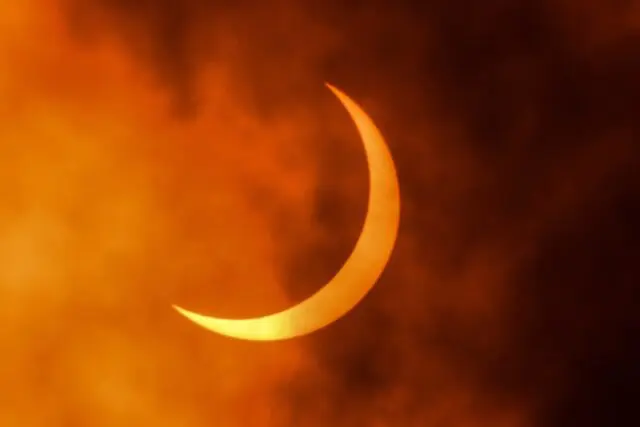This Saturday, October 14, the Moon will pass in front of the Sun, resulting in an annular eclipse.The National Meteorological Institute (IMN) reported on the conditions expected for this day.
“In general terms, normal rainy season conditions will occur with a slightly cloudy to partially cloudy sky during the morning. However, during the morning cloudiness will begin over the mountainous axis of the country,” the Institute reported.
Regarding visibility, it is expected that for the hours of the event Costa Rica will present conditions of little cloudiness to partially cloudy, in mountainous areas, a sky of partial to mostly cloudy could occur.
Northern Zone and Caribbean
The probability of rain during the hours of the event is low, however, a slightly cloudy to partly cloudy sky is expected. For the Caribbean, greater visibility is expected in coastal sectors
Central Valley
Partly cloudy to mostly cloudy skies are expected in mountainous sectors with a low to medium chance of rain. While in the western, southern and central sectors there could be a slightly cloudy to partially cloudy sky, therefore visibility could decrease.
In other areas
The most cloudy conditions are expected between 12:00 pm and 1:00 pm in most of the Central Valley, with better visibility to the east of the region. It is worth mentioning that the probability of rain between 12:00 pm and 1:00 pm remains moderate due to the moisture content in the Pacific. This probability is lower between 9:00 am and 12:00 pm.
North Pacific
Partial cloudiness is expected in mountainous sectors, in contrast, little cloudiness is expected in low-altitude sectors. It is recommended to move towards the coasts if you want to observe the event with greater visibility.The probability of rain in the sector is low during the forecast period, however, in mountainous regions this probability increases.
Central and South Pacific
Partly to mostly cloudy skies are expected in the mountains and light cloudy skies in low regions. The probability of rain during the event is moderate in the mountains and low on the coasts.

But in Costa Rica the ring of fire will not be complete. The phenomenon will be partial because the territory is outside the strip in which it can be seen in its entirety. In this way, the Moon will hide one side of the Sun and the luminous ring will always be incomplete.
The atmospheric changes that occur
There are a number of changes that occur in the atmosphere while an eclipse occurs.“First of all, in the absence of cloud cover, the Moon’s shadow will dramatically affect the luminosity and solar radiation reaching the ground. During the eclipse, the temperature drops, the relative humidity increases and eclipse breezes could be generated,” the meteorologist indicated.
Other situations that can be perceived are:
- Decrease in temperature by up to 5 degrees Celsius, especially if the eclipse occurs close to the time of maximum temperature
- The lowest temperature does not happen exactly during totality, but 10 to 30 minutes later
- Wind speed, which is also usually maximum at midday, would decrease by about 3 km/h
- Likewise the direction would vary by 20 degrees
“An “eclipse wind” is a change in the direction and speed of the wind that occurs when the moon blocks the sun, this is because the ground cools suddenly, just like at sunset,” explained the IMN.
According to experts, this situation means that warm air stops rising from the ground, causing a drop in wind speed and a change in direction, as the deceleration of the air across the Earth’s surface changes.As a consequence, daylight is expected to decrease by 85% in Guanacaste, 89% in San José and 91% in the Costa Rican Caribbean.
Recommendations for viewing the eclipse
In addition, experts make a series of recommendations to enjoy this event:
- Use special eclipse glasses
- Apply sun protection to the skin
- Do not expose yourself to the sun for a long time around midday
- Wear comfortable and protective clothing such as caps and hats
- Do not see the phenomenon directly without protection
- n Even with certified lenses, do not look at the sun for more than 5 seconds at a time and rest 20 seconds before looking at it again.


An annular solar eclipse is crossing the United States today and New Mexico is in the direct path of the eclipse. According to NASA, the solar eclipse will be visible in many parts of New Mexico, starting in the northwest of the state and ending in southeastern New Mexico. The best views are in the cities of Farmington, Albuquerque, Roswell and Hobbs, where about 90% of the eclipse will be visible. Areas outside the eclipse path can see about 80% of the eclipse.